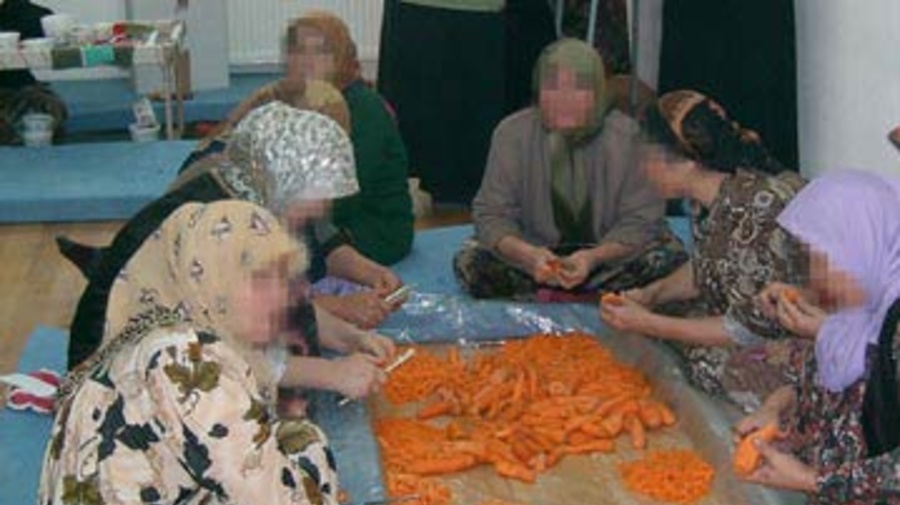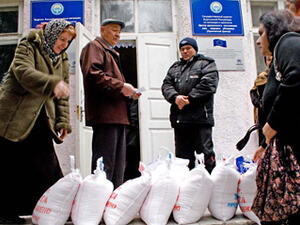Uzbek refugees wait in Romania for resettlement: "I went to the bazaar and ended up in a refugee camp"
Uzbek refugees wait in Romania for resettlement: "I went to the bazaar and ended up in a refugee camp"

Uzbek refugee women preparing food at the reception centre in Timisoara, Romania (faces pixellated to protect identities).
TIMISOARA, Romania, 7 Feb (UNHCR) - In the reception centre that has been home to hundreds of Uzbek refugees since they arrived in Romania this summer, 3-month-old Islam is known as "our little prince."
Islam's mother was four months pregnant when she fled Uzbekistan in the aftermath of the violent events in the Uzbek town of Andijan on May 12. For more than two months, she waited in neighbouring Kyrgyzstan before being evacuated with 438 other Uzbek refugees to Romania. Islam was born three months later in Timisoara and has become a symbol of joy and hope against the odds for this closely knit group that has gone through so much upheaval and uncertainty in the space of a few short months.
Rahman is still trying to come to terms with the dramatic changes in his life. A white-haired, elderly man who used to be a shopkeeper in Andijan, he still cannot believe what happened on that momentous day in May of last year.
"Isn't it crazy!" he exclaims. "I went to the bazaar in the morning as a merchant only to find myself as a refugee in a camp in Kyrgyzstan the next day!"
He had gone to open his shop like every morning, when people told him something unusual was happening on the main square. So he went there to see for himself. When he arrived on the square, a big crowd had already assembled. Soon afterwards, the first shots were fired. Rahman ran for his life. An unknown number of people died in the ensuing violence. Rahman and some 450 of his compatriots managed to flee into neighbouring Kyrgyzstan.
Their ordeal did not stop there - the Uzbek government put so much pressure on the Kyrgyz authorities to forcibly send back the group that in the end the decision was taken to evacuate the refugees to another country. Several Western states assisted UNHCR with the operation. The traditional resettlement countries such as the United States, Canada and Australia, as well as a number of European countries pledged to accept the Uzbeks for resettlement. The Romanian government generously offered temporary accommodation in a Timisoara reception centre until relocation procedures were finalised.
Initially, the group was meant to stay only a short period of time, but resettlement is a very labour-intensive and time-consuming activity. Recently, Romania extended residence permits for the remaining Uzbek refugees for another six months so resettlement countries can carry out all their administrative procedures without time pressure.
Little by little, the refugees are being resettled. Of the 439 who arrived in late July, more than 100 have now left for their permanent new homes. It is Rahman's last day at the centre - soon he will be in the United States. But his face saddens when he thinks of the future. His wife, children and grandchildren are all still in Andijan.
"Here they tell me that I will go to America," he says, "but if I had a choice, I'd rather go home."
The overall atmosphere in the camp is friendly, open and welcoming. Everybody tries to keep up a good mood and display as much hospitality as possible under the circumstances. Guests are invariably invited to join for lunch and walk away with a few Uzbek handicrafts and fond memories.
Community is very important in the Uzbek culture. The refugees enjoy the fact that they are still together before resettlement transplants them into new and different worlds that will challenge their flexibility and adaptability even further.
Whenever a group leaves the camp, all the other refugees line up in the courtyard to say good bye, even in the middle of the night with temperatures far below zero. So strong is their community spirit that they will not let anyone leave without a proper farewell.
For those who remain, life at the reception centre has taken on a semblance of normality. The refugees wasted no time upon their arrival in July to distribute beds and rooms, build a common kitchen in the courtyard and appoint people to be responsible for the cleanliness of the facilities, for food preparation, for representing the group in talks with the camp management and for teaching the children.
Today, seeing the refugees go about their business is like watching a well-choreographed ballet. Everyone knows his role and moves. Some women have been assigned to cut and clean the vegetables, while a group of men does the cooking. The teachers hold classes for the children in a variety of subjects such as maths, Uzbek and Russian language and geography. Women spend their free time sewing or making wonderful embroideries. Men play chess or table tennis. And everybody takes turns to look after the "little prince."
"It is amazing, how positive and cooperative these refugees are, how gratefully they accept our assistance. They are prepared to learn and to adapt to the new situation although, only a few months ago, it never occurred to them that they might become refugees," says a UNHCR resettlement officer, who is busy organising the refugees' final departure.
All the refugees attend orientation courses where they learn about their future countries. They are interested in everything: What do houses there look like? Will our children go to school? Will women have to work? Are winters very cold?
But while things are looking up for this group in Timisoara, the refugee agency remains concerned about the fate of four Uzbek refugees who are still in detention in Osh, in southern Kyrgyzstan. The four arrived in Kyrgyzstan along with the rest of the group and like all their compatriots were later recognised as refugees under UNHCR's mandate. They were detained in June following an extradition order from the Uzbek authorities and are still awaiting a decision on their fate.
Earlier this month, UNHCR called on the Kyrgyz government to refrain from any action aimed at forcibly sending back any of the four to Uzbekistan.
Under international law, the forced return of recognised refugees is a violation of the 1951 UN Refugee Convention to which Kyrgyzstan is a signatory. It is also against international law, including the Convention against Torture, to send people back to countries where they may face torture. There has been no independent investigation of the Andijan events.
(Names of refugees were changed for this article)
By Melita H. Sunjic in Timisoara, Romania









